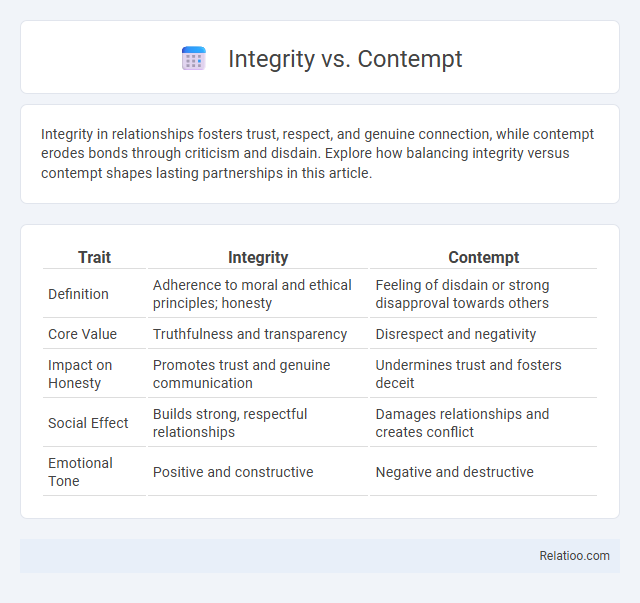Integrity in relationships fosters trust, respect, and genuine connection, while contempt erodes bonds through criticism and disdain. Explore how balancing integrity versus contempt shapes lasting partnerships in this article.
Table of Comparison
| Trait | Integrity | Contempt |
|---|---|---|
| Definition | Adherence to moral and ethical principles; honesty | Feeling of disdain or strong disapproval towards others |
| Core Value | Truthfulness and transparency | Disrespect and negativity |
| Impact on Honesty | Promotes trust and genuine communication | Undermines trust and fosters deceit |
| Social Effect | Builds strong, respectful relationships | Damages relationships and creates conflict |
| Emotional Tone | Positive and constructive | Negative and destructive |
Understanding Integrity: Core Principles Defined
Integrity encompasses honesty, moral uprightness, and consistency in ethical behavior, forming the foundation of trust in relationships and organizations. Contempt, characterized by disdain and disrespect toward others, undermines social cohesion and damages interpersonal bonds. Understanding these core principles highlights how integrity fosters respect and accountability, while contempt erodes mutual trust and cooperation.
The Roots of Contempt: Psychological and Social Origins
The roots of contempt lie in psychological factors such as deep-seated insecurity, unresolved trauma, and a need for superiority, which drive individuals to devalue others to protect their fragile self-esteem. Social origins include cultural norms, power imbalances, and group dynamics that reinforce contemptuous attitudes through stigmatization and exclusion. Understanding these origins is crucial for addressing and transforming contempt into empathy and integrity in interpersonal relationships.
How Integrity Shapes Personal and Professional Relationships
Integrity serves as the foundation for trust and respect in both personal and professional relationships, fostering open communication and reliability. When you consistently demonstrate honesty and ethical behavior, others are more likely to value your opinions and collaborate effectively. Contempt, in contrast, erodes connection by breeding resentment and damaging mutual respect, ultimately undermining relationship stability.
The Destructive Impact of Contempt on Trust
Contempt erodes trust by fostering disrespect and emotional distance, which undermines relational bonds at their core. Persistent contemptuous behavior generates resentment and defensiveness, diminishing open communication and mutual understanding critical for maintaining integrity. This destructive cycle damages the foundation of trust, making reconciliation and healthy interactions increasingly difficult.
Integrity vs Contempt in Leadership: Setting the Standard
Integrity in leadership establishes trust, accountability, and a culture of ethical behavior that drives team cohesion and performance. Contempt erodes respect and damages relationships, leading to a toxic environment that undermines collaboration and productivity. Your commitment to integrity sets the standard for others, influencing the overall success and reputation of your organization.
Recognizing Contempt in Everyday Interactions
Recognizing contempt in everyday interactions involves paying close attention to nonverbal cues such as eye-rolling, sneering, or dismissive gestures that convey disrespect or superiority. Your ability to identify these subtle signs early can prevent the erosion of trust and promote healthier communication. Integrity fosters respect and understanding, while contempt undermines relationships by signaling disdain and emotional disconnection.
Cultivating Integrity: Habits for Authentic Living
Cultivating integrity involves consistent honesty, accountability, and alignment between values and actions, fostering authentic living. Developing habits such as self-reflection, transparent communication, and ethical decision-making strengthens personal and interpersonal trust. Prioritizing integrity mitigates contempt and supports emotional well-being by promoting respect and genuine connections.
The Role of Integrity and Contempt in Conflict Resolution
Integrity fosters trust and openness, essential for effective conflict resolution by encouraging honest communication and accountability. Contempt, characterized by disrespect and disdain, undermines dialogue and escalates disputes, making resolution challenging. Your ability to maintain integrity while avoiding contempt can transform conflicts into opportunities for mutual understanding and cooperation.
Overcoming Contempt: Steps Toward Positive Change
Overcoming contempt requires recognizing negative patterns and fostering empathy in relationships, which strengthens emotional bonds and promotes mutual respect. Practicing active listening, expressing appreciation, and addressing grievances calmly reduce contempt's harmful effects and encourage positive communication. Consistent effort in building trust and understanding transforms conflicts into opportunities for growth and reinforces relationship integrity.
Integrity as a Foundation for Lasting Respect and Success
Integrity serves as the cornerstone for lasting respect and success by fostering trust, reliability, and authentic relationships in both personal and professional spheres. Contempt erodes these foundations, leading to damaged reputations and weakened connections that hinder growth and achievement. You build sustainable success by embodying integrity, which promotes consistent ethical behavior and earns genuine respect from others.

Infographic: Integrity vs Contempt
 relatioo.com
relatioo.com